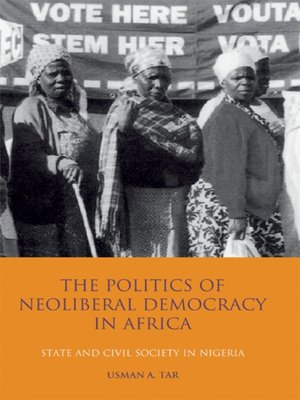The Politics of Neoliberal Democracy in Africa
ebook ∣ State and Civil Society in Nigeria
By Usman A. Tar

Sign up to save your library
With an OverDrive account, you can save your favorite libraries for at-a-glance information about availability. Find out more about OverDrive accounts.
Find this title in Libby, the library reading app by OverDrive.



Search for a digital library with this title
Title found at these libraries:
| Loading... |
Since the late 1980s the changing dynamic of global development has driven the tide of democratic expansion in the developing world. In Africa, where western donors have sought to impose 'neo-liberal' visions of socio-economic and political institution-building, there has been a contagious spread of political reforms and economic liberalisations with far-reaching consequences. Associated with external interventions, but also sometimes conflicting with them, are internal protests against authoritarianism, which have problematically reinforced and/or undermined the donor agenda for democratic reform. In 'The Politics of Neoliberal Democracy in Africa' Usman Tar questions the assumption that Africa was lacking the essential components for a spontaneous transition to democracy. This assumption has formed the basis of initiatives and programmes such as 'good governance agendas' and 'civil society capacity building programmes' which western donors have often put in place. Tar argues these programmes have not taken into account economies in Africa where capitalist development has not significantly flourished and where modes of social and political relations are conflictually tied to weak capitalist structures and pre-capitalist norms: culture, tradition and belief systems. Here, Usman Tar explores the dynamic, but contradictory, links between external and internal dimensions of neo-liberal democratic expansion in Africa, focusing on Nigeria. He examines the realpolitik of changes in global balance of power and its impact on domestic structural and socio-economic changes, with far reaching implications for state-society relations and linkages of the state, civil society, governance, democracy and citizenship. In doing so he dissects the struggles for democracy and for democratic policy and practice in a country with rich economic potential but a troubled political dispensation.






